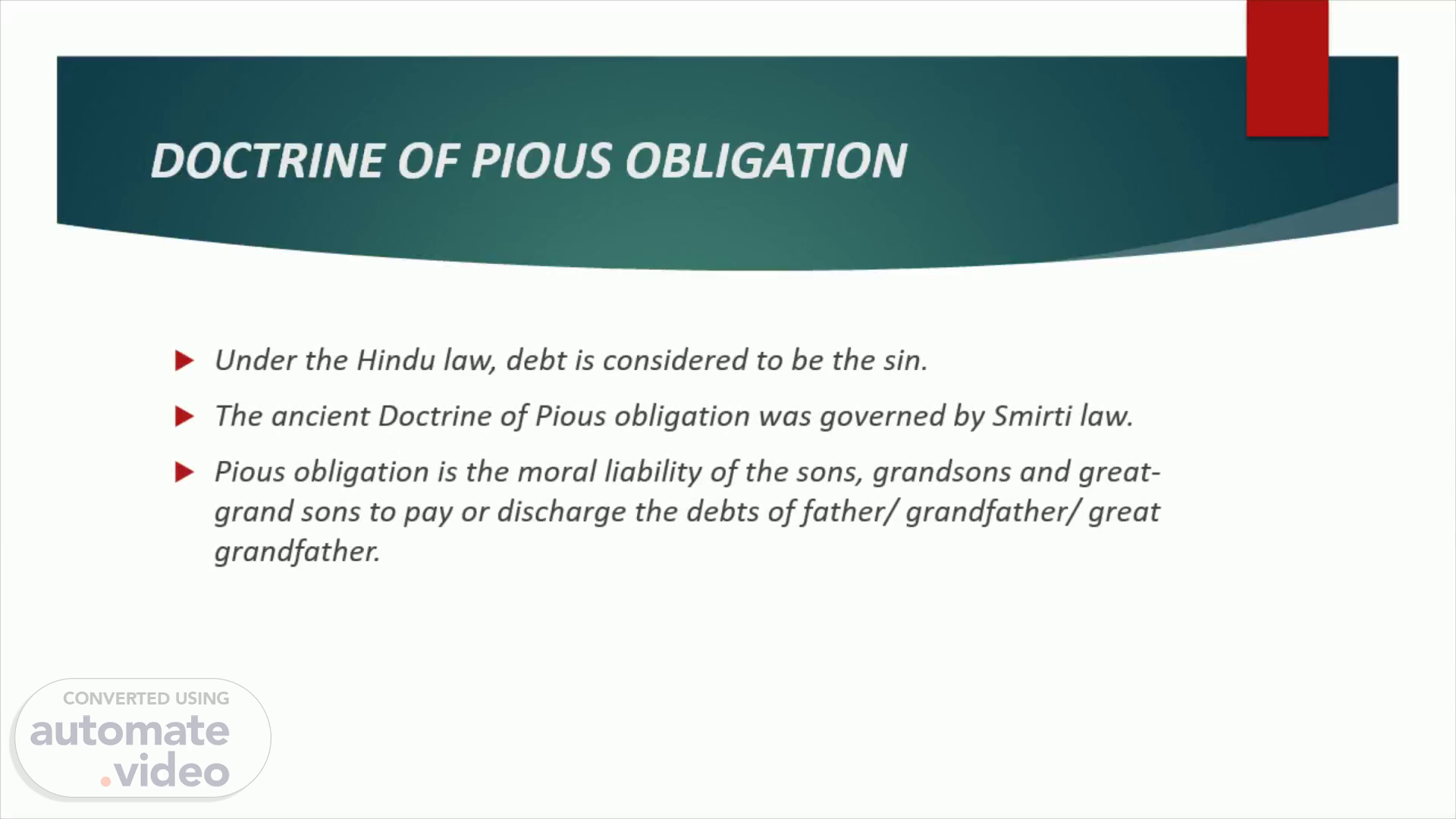
DOCTRINE OF PIOUS OBLIGATION
Scene 1 (0s)
DOCTRINE OF PIOUS OBLIGATION. Under the Hindu law, debt is considered to be the sin. The ancient Doctrine of Pious obligation was governed by Smirti law. Pious obligation is the moral liability of the sons, grandsons and great-grand sons to pay or discharge the debts of father/ grandfather/ great grandfather..
Scene 2 (17s)
According to Brihaspati, “ If a father is no longer alive the debt must be paid by his son”. According to Yajnavalkya , a son need not pay in this world father’s debt incurred for spiritual liquor, for gratification of lust or gambling, nor a fine, nor what remain unpaid of a toll, nor idle gift. But in case of debts for purposes other than the above, on the death of the father, or on his going abroad, or suffering from some incurable disease, the debt contracted by him would be payable by his son and grandson..
Scene 3 (43s)
NATURE OF LIABILITY:. According to Myne , the liability of a Hindu to pay debts contracted by another raise from different sources:- Religoius duty – Those who take assets must bear the liability also. Legal obligation – The legal duty of paying a debt contracted by one as an agent is based on the principle that the obligation incurred by the agent must be paid of by the principle. Extent of the liability of son, son’s son and son’s son’s son under the Hindu Law Son was required to pay of the debt of father with interest The grandson was liable to pay only the principal amount The great- grandson was required to pay only to the extent to the joint family property in his hands..
Scene 4 (1m 14s)
The son and grand son were made personally liable to pay the debt but the great-grandson was not held personally liable. The debt should not be Avyavaharika i.e. debt taken for an immoral or illegal purpose When a debt is contrary to or against good moral it is called Avyavaharika debt. E.g. – Debts due to gambling, unpaid fines, debts due to lust etc.,,.
Scene 5 (1m 35s)
The debts should not be time barred. The sons are not bound to pay time barred debt of their father. The debts must be antecedent. This doctrine is not recognized under the Dayabhaga school..
Scene 6 (1m 48s)
CASE:. Apentala Raghavaiah Vs. Boggawarapu Peda Ammayya In this case, the offended party’s father Yellamanda did Tobacco business with the respondent and subsequently ended up plainly indebted to him and because of which the father sold the property to a litigant for paying off the debts. The respondent contested the request of by documenting his counter fighting that the Tobacco business was finished by the father the applicant for the advantage the joint family and the debt shrunk by him is not ‘ Avyavaharika debt’ that the candidate is obligated to discharge such debt brought about by his father regarding such business..
Scene 7 (2m 14s)
ABOLITION OF PIOUS OBLIGATION:. Section 6(4) of the Hindu succession Act 1956 (Amendment) Act 2005, no court shall recognize any right to proceed against a son, grandson and great grandson for the recovery of any debts from his father, grand father or great grand father solely on the ground of the pious obligation under the Hindu law, of such son, grand son, great grandson to discharge any such debt..